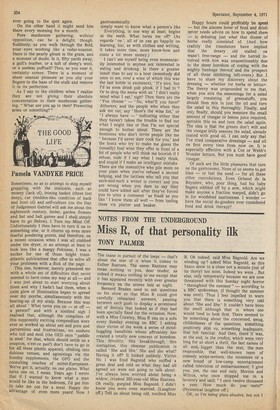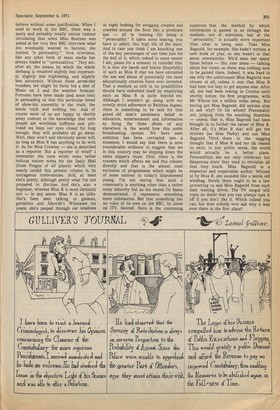NOTES FROM THE UNDERGROUND
Miss R, of that personality ilk
TONY PALMER
The inane in pursuit of the inept — that's about the size of it when it comes to Esther Rantzen. The name Rantzen may mean nothing to you, dear reader, as indeed it means nothing to me except that it has appeared recently with ever greater frequency on the screen late at night.
Bernard Braden used to ask questions on his show so that Miss R could give carefully rehearsed answers, pausing between each gush to display a prominent set of dentals that looked as if they had been specially fixed for the occasion. Now, with a Miss Crawley, Miss R sits on a sofa every Sunday evening on BBC 1 asking their victim of the week a series of mindboggling banalities whose affrontery has created a totally new concept of boredom. This frivolity, this breakthrough, this corruption, this obscene publication is called 'She and She.' She and she what? Having it off? It looked unlikely. Victim No I was Enid Bagnold who sniffed a great deal and told us what they had all agreed we were not going to talk about. I've always been worried about being a widow, creaked 305-year-old Miss Rantzen. Oh really, gurgled Miss Bagnold. I didn't know you were even married. (Laughter off.) Tell us about being old, toothed Miss
R. Oh indeed, said Miss Bagnold. Are we winding up ? asked Miss Bagnold, as this fiasco drew to a close not a minute (out of its thirty) too soon. Indeed we were . But alas, only temporarily because we are now threatened with this Sunday night horror "throughout the summer" — according to a BBC spokesman, (I thought the summer was over). Thus I feel impelled to warn you that there is something very odd about 'She and She.' It couldn't have been the smell although that is where one would tend to look first. There seemed to be something about the concerned, smug, childishness of the questions, something positively déjà vu, something inadequate, that felt familiar. And then, there it was, at the end, in the credits, which were very long for so short a thrill, the last names of all and,bigger than the rest, the men responsible, that well-known team of comedy script-writers, the inventors of a new brand of low-camp entertainment called television of embarrassment, I give you, yes, the one and only, Morton and Wilcox, who once stopped me in a lavatory and said; "I earn twelve thousand a year. How much do you earn?" (Hysterical laughter off.) OK, so I'm being plain abusive, but not I
believe without some justification. When I used to work at the BBC, there was a nasty and probably totally untrue rumour circulating that when Miss Rantzen was asked at her very first BBC interview what she eventually wanted to become, she replied, "a personality." Now television, like any other form of mass media has always traded in "personalities." They are, after all, the means by which the whole shebang is rendered slightly less impersonal, slightly less frightening, and slightly less autocratic. Without these seven-day wonders, we might be force fed a diet of Music on 2 and the weather forecast. Fortunes have been made (and some lost) in persuading us that this particular breed of show-biz nonentity is the truth, the whole truth and nothing but. And of course most of us are happy to chortle away content in the knowledge that such people are worthless buffoons and provided we keep our eyes closed for long enough, they will probably all fo away. Well, they won't and obviously never will, as long as Miss R has anything to do with it. As for Miss Crawley — she is described as a reporter. But a reporter of what? I remember she once wrote some rather tedious nature notes for the Daily Mail (from Prague of all places) which very nearly outdid this present column in its outrageous irrelevancies. Still, at least she's pretty, although pretty what I'm not prepared to disclose. And she's also a beginner, whereas Miss R is most Certainly not —in any sense. Miss R is an oldie. She's been seen talking to gnomes, geriatrics and Jehovah's Witnesses for years; she's peeped through car windows at night looking for snogging couples and crawled around the floor like a prostrate ape — all in training for being a "personality." It takes some beating, you have to admit, this high life of the stars. And in case you think I am knocking one of the key personages of our time just for the hell of it, which indeed to some extent I am, pause for a moment to consider this. It is into the hands and brains (hopefully) of such as Miss R that we have entrusted the use and abuse of potentially the most educationally creative force ever invented. That a medium so rich in its possibilities should have enfeebled itself by employing such as Miss R is quite beyond me. Although I wouldn't go along with my overtly strict adherence to Reithian dogma, there is something to be said for that grand old man's passionate belief in education, entertainment and information as being the three ideals of any elsewhere in the world how this noble broadcasting system. We have seen ambition has been corrupted into a nonsense; I would say that there is now considerable evidence to suggest that we in this country may be slipping down the same slippery slope. First, there is the concern which affects me and this column directly and that is the almost total exclusion of programmes which might be of some interest to today's dispossessed young. I'm not saying that such a community is anything other than a rather noisy minority but as the recent Oz fiasco demonstrated, it represents something more substantial. But that something has no voice of its own on the BBC, let alone on ITV. Second, there is the continuing suspicion that the method by which information is passed to us through the medium, not of television, but of the "personality," is actually more important than what is being said. Take Miss Bagnold, for example. She hadn't written a new book or play, so she wasn't in that sense newsworthy. We'd seen her many times before — this year alone — talking about her views, so there was nothing new to be .gained there. Indeed, it was hard to see why the unfortunate Miss Bagnold was chosen at all, unless it was that Miss R had been too lazy to get anyone else. After all, she had been resting in Corsica until shortly before the first programme, with Mr Wilcox not a million miles away. But having got Miss Bagnold, did anyone stop to ask why? Or for whom? Presumably not, judging from the resulting shambles — unless, that is, Miss Bagnold had been brought in to further the career of Miss R. After all, it's Miss R that will get the reviews (as does Parky) and not Miss Bagnold. Third, there is the nagging thought that if Miss R and her ilk ceased to exist, in any public sense, the world would actually be a better place. Personalities are not only irrelevant but dangerous since they tend to trivialise all that they touch. Miss Bagnold is a respected and respectable author. Whined at by Miss R, she sounded like a senile old windbag. Surely there ought to be a law protecting us and Miss Bagnold from such time wasting drivel. The TV mogul will reply no doubt that you can always turn it off if you don't like it. Which indeed you can; but does nobody ever ask why it was ever there in the first place?



































 Previous page
Previous page